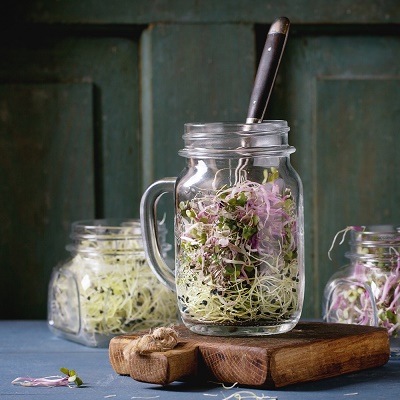 Sprouted foods are something most people consume on a daily basis without even knowing it. There are two main types of sprouted foods and they are sprouted grains and sprouted seeds.
Sprouted foods are something most people consume on a daily basis without even knowing it. There are two main types of sprouted foods and they are sprouted grains and sprouted seeds.
The most common sprouted grains we consume are: sprouted buckwheat, sprouted brown rice, sprouted maize, and sprouted barley.
The most common sprouted seeds include: alfalfa, coriander, pumpkin seeds, and muskmelon seeds.
Take a few minutes to read about the health benefits of both types of sprouted foods and see if any can be beneficial to add to your daily diet!
Sprouted Grains
There is no official definition of sprouted grains, but they are essentially just whole grains that are stopped in the middle of their growing process. They are placed into products such as bread or cereal after they have sprouted, but before they become an actual plant.
There are two subtypes of sprouted grains: dry and wet.
The grains that have sprouted and are then dried out in order to last longer are considered dry sprouted grains. These are commonly placed into cereals or granola foods.
Sprouted grains that are mashed into a paste-like consistency and then baked into products such as breads and muffins are considered wet sprouted grains.
Health Benefits of Sprouted Grains
Although not much research has gone into the study of sprouted grains, those that have been conducted seem to produce a fairly consistent set of results.
- Research shows that by letting the grains sprout, essential nutrients, such as Vitamins B and C, Fiber, Folate, and a few amino acids, such as l-Lysine maintain their quality and are much more plentiful than in unsprouted grains.
- The enzyme known as Amylase is also plentiful in sprouted grains. This enzyme helps break down sugars, allowing for easier digestibility of the grain.
- Sprouted grains are also easier to digest, making them a great alternative for people who have a mild sensitivity to gluten. However, this grain does not replace the gluten found in products, such as bread or muffins. People with Celiac disease or a severe sensitivity to gluten should not consume such foods unless they are clearly labeled as gluten free.
Sprouted Seeds/Beans
Sprouted seeds are very similar to sprouted grains, but, have a few different health benefits.
Sprouted seeds and beans include: alfalfa, mung bean, coriander, carrots, and pumpkin seeds.
By sprouting seeds/beans yourself or purchasing foods that contain sprouted seeds/beans, you are more likely to consume higher amounts of nutrients than you would if you ate unsprouted foods.
Seeds and beans that have been sprouted have a higher amount of Vitamins A, B, C, and neutralize enzymes that can be harmful to the digestive system.
Nutritional Benefits of Sprouted Seeds/Beans
Like sprouted grains, not much research has gone into the study of sprouted seeds/nuts. The studies that have been conducted do report results of nutritional benefits, as well as health benefits.
- As far as the nutritional value goes, studies show that sprouted seeds/beans have higher levels of essential nutrients that are vital to the body. Nutrients such as fiber, protein and a variety of Vitamin B supplements are abundant in these foods.
- Sprouted seeds also contain a fairly high amount of digestive enzymes that will help the body break down the nutrients and help distribute them to the body much faster.
- A couple studies have also shown that sprouted seeds help lower or maintain blood sugar. The antioxidant known as sulphoraphane is common amongst sprouted foods. Sulphoraphane is known for its ability to improve the amount insulin taken into the body, which will help regular blood-sugar levels.
Overall, sprouted foods do have nutritional benefits that most non sprouted foods do not have. Higher levels of nutrients and vitamins are common in both sprouted grains and sprouted seeds/beans. Consider adding sprouted grains into your diet if you are sensitive to gluten or if you just want to improve your overall level of health.



